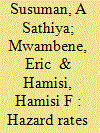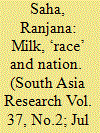| Srl | Item |
| 1 |
ID:
140120


|
|
|
|
|
| Summary/Abstract |
Tanzania’s child mortality rate—between 103 and 130 deaths per 1000 live births–is well above the world average. The data from the Tanzania HIV/AIDS and Malaria Indicator Survey 2007/08 were used in order. There were 27,511 children included in the analysis. Regression analysis focused on child mortality based on maternal and fertility behaviours. Children belonging to the group of higher birth order faced 0.17 odds of dying. A birth spacing of 24 months or longer was observed in the successive birth interval for 76% of the respondents. Focusing on the study’s findings, encouraging longer breastfeeding practice is one way to help produce a healthy baby.
|
|
|
|
|
|
|
|
|
|
|
|
|
|
|
|
| 2 |
ID:
153130


|
|
|
|
|
| Summary/Abstract |
This article analyses medical opinion about nursing of infants by memsahibs and dais as well as the Bengali-Hindu bhadramahila as the ‘immature’ child-mother and the ‘mature’, ‘goddess-like’ mother in the tropical environment of nineteenth and early twentieth century Bengal. It shows how the nature of lactation, breast milk and breastfeeding are socially constructed and become central to medical advice on motherhood and childcare aimed at regenerating community, ‘racial’ and/or national health, including manly vigour for imperial, colonial and nationalist purposes. In colonial Bengal, the topic of breastfeeding surfaces as crucial to understanding colonial and nationalist, medical and medico-legal representations of maternal and child health constituted by gendered, racialised, classed and caste-ridden, biological/cultural and pure/polluting traits, often considered transferable through milk and blood.
|
|
|
|
|
|
|
|
|
|
|
|
|
|
|
|